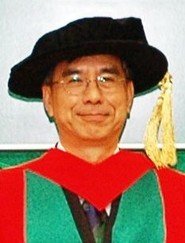致謝詞

Mr Pro-Chancellor, Mr Vice-Chancellor, members of the university, fellow graduands, honorable guests:
Words cannot express how privileged I am to be standing here today, and to deliver this address on behalf of my distinguished fellow graduands. I would use this opportunity to share with you some of my reflections on the purpose of university education, as my class celebrates this year the 30th anniversary of our graduation. With all the resource put into building and maintaining a university, what can society expect of it?
An immediate answer that comes to mind is the role of universities in training and producing the backbone that makes up and maintains the fabrics of society. Like a giant machine it produces all kinds of professionals such as lawyers, civil servants, doctors, engineers, social workers, teachers, business and community leaders. University education equips them with the necessary knowledge and skills to ensure the smooth running of a prosperous and competitive society like Hong Kong.
Yet we all know that the purpose of university education far exceeds the simple production of technocrats to run the engines of economic growth. As our name, "homo-sapiens", implies, a society of "wise beings" should be distinguishable from all other creatures, not only by our ability to acquire skills and apply them, but also to study about the relationship between matters, to discover laws that govern our universe. Hence another important purpose for the university is to carry out research, the quest to ever broaden the boundaries of human knowledge, for the benefit of all species.
Beyond the above, I think it is vitally important for her scholars and students to ponder upon the deeper questions pertaining to meaning, and purpose, and value of human existence. The university should act as an advocate, an opinion leader in guiding our society forward, towards the ultimate goal of building a harmonious society. Put it another way, a university should work towards the building up of social capital - the norms and networks that upholds a society, as Robert Putnam so succinctly put it. (Putnam R. " Bowling Alone" NY: Simon & Schuster 2000 p. 19) Without these civic virtues, society would be void of a soul, driven by greed, ego and self-interest; it will only run full-steam to inevitable self-destruction.
No wonder that our predecessors have it so crisply and clearly enshrined in our university motto - sapientia et virtus. Wisdom and character. But what is the connection between the two? How does a university build virtue in her students? For apart from occasional lectures on business or medical ethics, one does not find too many structured courses about virtues in a university's syllabus.
I venture to suggest that the only way for virtues to be transmitted is to have it caught rather than taught. It is the life examples of university professors, teachers and mentors - as they demonstrate vigorously in the safeguarding of integrity while pursuing academic excellence, as they up-hold truth and justice at all cost, as their exemplary lifestyles bespeak of a life dedicated to helping and influencing the young. And on rare occasions, should the situation so demands as in Blacksburg Virginia one week ago, to willingly put oneself in harm's way to protect his students from the bullets of an insane assailant - it is these unspoken values that permeate a university's culture, that will leave an indelible impact on her students. This influence will set them thinking about the purpose of life, about values beyond the making of money and beyond self-interest. And as they seek, some will find the truth, and the truth will set them free. (John 8:32) Free from the pressure of a materialistic worldview, free from the misguided notion that success depends on how much money one makes, free from the power of greed, thinking that it is always better to have more. And they will realise some day, through personal experience and not just hearsay, that it is more blessed to give, than to receive. (Acts 20:35)
Before I conclude, Mr Vice-Chancellor and members of the university, I must express on behalf of my fellow graduands here today, how proud we are to be a graduate of this university. By exemplifying how "wise beings" should live, your constant and tireless efforts have produced generations of graduates that are not only wise but also virtuous. You have richly built up the social capital of our city and shaped her conscience.
And for that, again we thank you.




